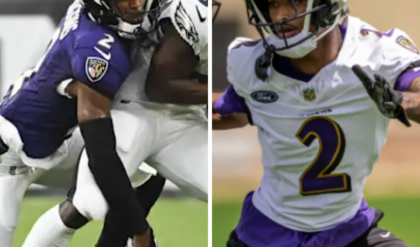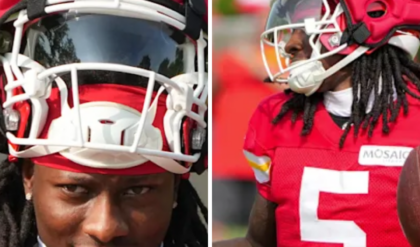More than MVP candidates, the Lynx’s Napheesa Collier and Fever’s Caitlin Clark have drawn comparisons to Red Grange and Tiger Woods when it comes to growing the WNBA.
Indiana Fever guard Caitlin Clark tries to maneuver around Lynx guard Natisha Hiedeman last month at Target Center. (Ayrton Breckenridge/The Minnesota Star Tribune)
Friday night, the Lynx will play the Fever in Indianapolis.
Meaning that two of the hottest teams in the WNBA will face off. So will the two WNBA players of the month — Minnesota’s Napheesa Collier in the Western Conference and Indiana’s Caitlin Clark in the Eastern Conference.
At the peak of a fine career, Collier is for the first time a true MVP candidate while leading the league’s most surprising success story.
In her first season as a pro, Clark is rapidly turning into a superstar and elevating what had been a terrible franchise.
The story of these two, though, goes deeper.
They’re not just great players.
They’re not just game-changers.
They’re business-changers.
Collier, along with New York Liberty star Breanna Stewart, is the founder of Unrivaled, a women’s three-on-three league that will start in Miami in January, giving WNBA players a chance to make money in the offseason without playing overseas.
In this way, Collier is a little like the great running back Red Grange, who wielded his popularity by starting a barnstorming football tour that helped popularize football in America.
Clark is remindful of someone a little more recent, and much more influential.
When Tiger Woods joined the PGA Tour at the age of 20, he was met with jealousy and incredulity.
Long before Fuzzy Zoeller made racist comments about Woods at the Masters, other golf pros were simply disgusted by what they believed was Woods’ unearned fame. They thought he was a sideshow, a novelty, instead of someone who would dominate the tour.
They were wrong in many ways. Woods would blow away the field at the Masters when he was 21 and go on to become perhaps the most dominant golfer ever during his prime.
And all those PGA Tour members who griped about his arrival? He made a lot of them rich.
Woods took a staid, uptight, tradition-bound sport and made it cool. He attracted kids to golf, as well as people of color who may have felt they were not welcome in the game.
His popularity drove massive TV ratings that led to larger tournament payouts.
And his ability to elevate Nike as a golf brand benefited everyone in the industry.
Clark is following Woods’ path. She was a dominant college player who faced resentment when she became a pro, from players who felt she was cutting to the front of the line in terms of popularity.
Her combination of spectacular play, competitive fire and college fan base has helped accelerate the increasing popularity of women’s basketball and women’s sports.
And her ability to attract and survive attention and criticism has made the WNBA a frequent topic of conversation on the shows and networks that can drive a sport’s revenues.
Basketball greats Sheryl Swoopes and Nancy Lieberman have conducted a public debate about Clark’s place in the game. That has been bad for their relationship, but in the modern media culture that promotes and amplifies debates, it’s gold for the WNBA.
In terms of basketball, Collier and Clark both have a chance to get MVP votes this season. Collier is the best player on the most surprising team in the league. Clark has become a dominant force while turning the beleaguered Indiana franchise into an instant contender.
Clark is taking the Woods approach of letting action drive popularity.
What Collier is doing requires more than just being good at basketball.
She and Stewart, whose incomes are limited by current lack of TV revenue generated by the WNBA, are putting their own time into what must be an enormous endeavor — attracting investors, and taking the responsibility for building a league that will reward those investors and benefit players.
Their approaches fit their personalities. Collier is usually reserved and polite when speaking in public. She’s comfortable letting her play, and her league, speak for themselves.
Clark is feisty and brash, and an exceptional interview. She handled the pressure of becoming college basketball’s greatest ambassador, and now she is handling the pressure of elevating an entire league that shouldn’t have needed further elevation.
The Fever, not the tradition-rich and surging Lynx, lead the WNBA in both home and road attendance.
Clark vs. Collier: You can call it an epic basketball matchup, or an epic business meeting.





